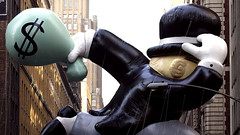Although the SEC recently asked Congress to pursue legislation that toughen laws and to raise financial penalties for fraud violations, a new report suggests that the Commission is avoiding tough sanctions already at its disposal.
Analysis shows that the Securities and Exchange Commission has been giving waivers to the biggest Wall Street firms in the last decade, letting them off on punishments meant to apply to fraud cases. The New York Times found nearly 350 instances in the last 10 years where the SEC has allowed financial giants like JPMorgan Chase, Goldman Sachs, and Bank of America to have advantages reserved for only the most dependable of companies and avoiding punishments when their financial forecasts turn out to be wrong.
According to the report, JPMorgan Chase has settled six fraud cases in the last 13 years, but was granted at least 22 waivers. Bank of America has settled 15 fraud cases and received at least 39 waivers.
Via:
By granting exemptions to laws and regulations that act as a deterrent to securities fraud, the S.E.C. has let financial giants like JPMorganChase, Goldman Sachs and Bank of America continue to have advantages reserved for the most dependable companies, making it easier for them to raise money from investors, for example, and to avoid liability from lawsuits if their financial forecasts turn out to be wrong.
An analysis by The New York Times of S.E.C. investigations over the last decade found nearly 350 instances where the agency has given big Wall Street institutions and other financial companies a pass on those or other sanctions. Those instances also include waivers permitting firms to underwrite certain stock and bond sales and manage mutual fund portfolios.
JPMorganChase, for example, has settled six fraud cases in the last 13 years, including one with a $228 million settlement last summer, but it has obtained at least 22 waivers, in part by arguing that it has “a strong record of compliance with securities laws.” Bank of America and Merrill Lynch, which merged in 2009, have settled 15 fraud cases and received at least 39 waivers.
Only about a dozen companies — Dell, General Electric and United Rentals among them — have felt the full force of the law after issuing misleading information about their businesses. Citigroup was the only major Wall Street bank among them. In 11 years, it settled six fraud cases and received 25 waivers before it lost most of its privileges in 2010.
That $228 million fraud settlement by JPMorgan Chase last summer? It was to settle civil and criminal charges that it "cheated cities and towns by rigging bids with other Wall Street firms to invest the money raised by several municipalities for capital projects." Yet the S.E.C. granted three waivers related to that case for privileges that it otherwise would have lost.
The S.E.C. said waivers were granted because "the company’s fraudulent actions didn’t involve misleading investors about JPMorgan’s business."
Screw cities, towns and the people in them, but heaven forfend not the investors.



















